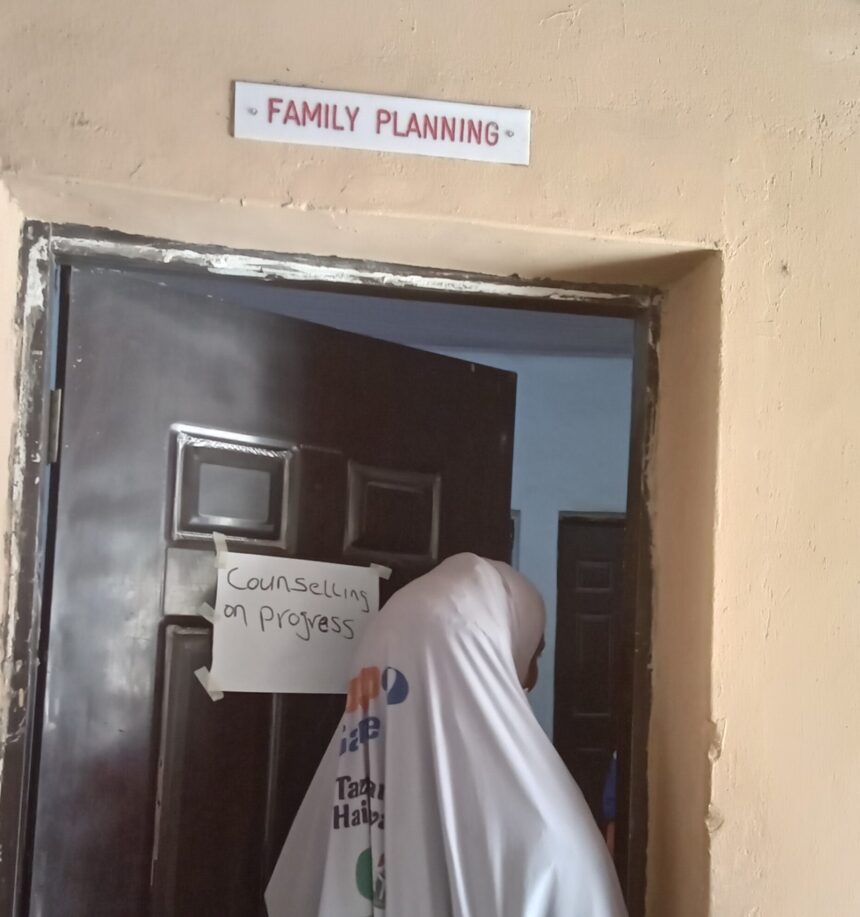A Jigawa woman’s story of multiple conceptions after failed attempts to access Family Planning services
Rabi Ahmad, a 42-year-old mother from Nasara village in Jigawa State, did not plan for her 13th child. Yet, she now cradles her 22-month-old daughter, Rukayya, a living reminder of the widening gap between rising demand and limited access to family planning services in rural Nigeria.
Speaking in an interview conducted in Dutse, Mrs. Ahmad shared her journey of unintended pregnancy following multiple failed attempts to access contraceptives at the Hammayayi Primary Health Centre in Dutse Local Government Area.
“That pregnancy test almost made me cry,” she recalled. “I kept going to the clinic, and each time they said, ‘Come back next week.’ Before I knew it, I was pregnant again. I couldn’t terminate it—this is God’s will. But this should not keep happening.”
Mrs. Ahmad said she had walked over 13 kilometers from her home with her infant and a dog-eared appointment card, only to be told once again that the injectable contraceptives she prefers were out of stock.
“Each pregnancy came with its own difficulties. I’ve lost three of my children already. We love them, but my body and heart are tired. This was supposed to be the end,” she said.
Rising Fertility, Shrinking Access
Jigawa State has one of the highest fertility rates in Nigeria, with an average of 6.9 births per woman, according to the National Demographic and Health Survey (NDHS).
Despite national efforts to promote reproductive health, contraceptive uptake in Jigawa remains alarmingly low. Data from the National Demographic Health Survey (NDHS 2023-24), revealed that, following on contraceptive use in Jigawa State, 96% of women in the state do not use any form of contraception while only 3.5% use modern contraceptive methods such as injectables, implants, or pills.
Although the demand for planning services is growing in Jigawa State, the barriers have not faded as fast. This is as stockouts at healthcare facilities have become a recurring obstacle, even though the government mandates free access to family planning commodities.
This, as voiced out by Mrs. Ahmad’s case is not isolated. Other women across Dutse and surrounding communities have expressed similar frustrations.
Zaliha Usman, 25, said she began seeking contraceptives five months ago after getting her husband’s consent, but was turned away from multiple facilities due to lack of supplies.
“Everywhere we go, they say there are no commodities. How can we plan our families without the tools?” she asked.
Madaniya Habibu, a mother of five, recounted how she was asked to purchase contraceptives that were previously free at the same clinic.
“We were told to buy the commodities ourselves, but many of us cannot afford them. Transport to these clinics alone costs a lot,” she added.
Several other women in Kudai and Kachi Primary Healthcare Centres expressed similar concerns during the commemoration of Safe Motherhood Day, noting that their most preferred family planning methods (injectibles) are always stocked out while the others such as IUD are always available to the point of expiration.
“We are told to wait for new stock, but time doesn’t wait,” said Malama Karimatu Sani, a mother of three. “By the time they restock, many of us are already pregnant again.”
Healthcare Workers Caught in the Middle
At the Kachi Primary Health Centre, service provider Amina Sulaiman confirmed a two-month stockout of contraceptives.
“It’s painful to send women home empty-handed. They come desperate, hoping to avoid another pregnancy, and we have nothing to give. Their husbands also get frustrated,” she said.
At the Limachi Health Centre, Amina Adamu added that while the willingness to adopt family planning has increased, affordability remains a barrier.
“Many men are now encouraging their wives to adopt family planning, especially with the rising cost of living. But they expect the services to be free, as the government promised,” she said during an interview at the facility on the 2025 National Safe Motherhood Day.
A Complex Web of Cultural, Economic, and Systemic Challenges
The high birth rate in Jigawa is fueled by a mix of factors including low levels of female education and household income; Strong religious and cultural influences favoring large families and limited access to healthcare, especially in rural areas.
While facility-based deliveries have risen modestly from 6.8% in 2015 to 18.2% in 2023, access to reproductive health remains poor. Inconsistent supply of contraceptives, inadequate staffing, and poor infrastructure continue to hinder progress.
For women like Rabi Ahmad, the stakes are deeply personal. Each pregnancy she carries could come at the cost of her health—or her life.
“We love our children. But even Allah gives us wisdom to plan. We need help,” she said.
Her story, and those of countless other women in Jigawa, highlight a critical need, which is not only for increased funding and stock of family planning commodities but also for stronger community education, male involvement, and accountability in healthcare delivery.
Until then, many women in Jigawa remain trapped in a cycle of unintended pregnancies, hopeful yet helpless in their quest for reproductive choice.
The story, coordinated by Onche Odeh, features contributions from members of the Jigawa State Family Planning Advocacy Group,





